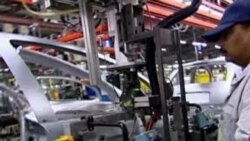The United States and the European Union are likely to begin negotiations as early as June on what some are calling a "ground breaking" free trade agreement. International trade experts say such an agreement would have substantial economic benefits on both sides of the Atlantic. But the obstacles are many and success is far from guaranteed.
President Barack Obama raised the prospects of a Transatlantic free trade zone at his annual State of the Union address.
"Because trade that is free and fair across the Atlantic supports millions of good paying Americans jobs," Obama said.
European Commission President Jose Manuel Barroso was quick to endorse the proposal, saying a comprehensive trade deal with the U.S. would boost Europe's flagging economy.
"It is estimated that when this agreement is up and running, the European economy will get a stimulus of a half percent of our GDP, which translates into tens of billions of euros every year and tens of thousands of new jobs," Manual Barroso said.
In short -- a win-win for developed western nations.
But Sharan Burrow at the International Trade Union Confederation warns an agreement based purely on economic gain will hurt workers in the U.S. and Europe.
"Now -- if it's collaborative, if it's built on a value set that says we want to share the wealth so tools like collective bargaining are absolutely at the core, so we get the distributional effects // it could be very interesting," Burrow said.
The concern is that eliminating barriers to trade and investments will undermine collective bargaining agreements and shift production to areas where labor is cheapest.
But trade expert Daniel Ikenson at the Cato Institute says that should not be an issue for the U.S.
"In fact, Europe's labor standards are widely considered to be higher than ours so the U.S. labor movement would be less likely to oppose the agreement," Ikenson said.
Instead, he says negotiations could focus on harmonizing technical and regulatory standards.
"If you produce something in the United States for example -- a washing machine -- the electrical cord needs to be three feet and in the European Union, it needs to be one meter, which is three feet and three inches," Ikenson said.
Given that trade tariffs are already low between the U.S. and Europe, major hurdles are likely to revolve around subsidies -- the financial aid governments give such groups as farm producers and aircraft manufacturers to stay competitive.
But even if both sides are able to work out their differences, labor leader Sharan Burrow says more trade is not the cure for a weak global economy.
"This economy is never going to get back on track in the global context unless we can do something about stopping the attack on worker's rights -- giving the world a pay raise so people can build a capacity to live on what they earn and stabilize demand," Burrow said.
Trade between the U.S. and Europe accounts for nearly half of the world's economic output. Analysts say greater trade would further cement the partnership and help counterbalance China's growing clout.
President Barack Obama raised the prospects of a Transatlantic free trade zone at his annual State of the Union address.
"Because trade that is free and fair across the Atlantic supports millions of good paying Americans jobs," Obama said.
European Commission President Jose Manuel Barroso was quick to endorse the proposal, saying a comprehensive trade deal with the U.S. would boost Europe's flagging economy.
"It is estimated that when this agreement is up and running, the European economy will get a stimulus of a half percent of our GDP, which translates into tens of billions of euros every year and tens of thousands of new jobs," Manual Barroso said.
In short -- a win-win for developed western nations.
But Sharan Burrow at the International Trade Union Confederation warns an agreement based purely on economic gain will hurt workers in the U.S. and Europe.
"Now -- if it's collaborative, if it's built on a value set that says we want to share the wealth so tools like collective bargaining are absolutely at the core, so we get the distributional effects // it could be very interesting," Burrow said.
The concern is that eliminating barriers to trade and investments will undermine collective bargaining agreements and shift production to areas where labor is cheapest.
But trade expert Daniel Ikenson at the Cato Institute says that should not be an issue for the U.S.
"In fact, Europe's labor standards are widely considered to be higher than ours so the U.S. labor movement would be less likely to oppose the agreement," Ikenson said.
Instead, he says negotiations could focus on harmonizing technical and regulatory standards.
"If you produce something in the United States for example -- a washing machine -- the electrical cord needs to be three feet and in the European Union, it needs to be one meter, which is three feet and three inches," Ikenson said.
Given that trade tariffs are already low between the U.S. and Europe, major hurdles are likely to revolve around subsidies -- the financial aid governments give such groups as farm producers and aircraft manufacturers to stay competitive.
But even if both sides are able to work out their differences, labor leader Sharan Burrow says more trade is not the cure for a weak global economy.
"This economy is never going to get back on track in the global context unless we can do something about stopping the attack on worker's rights -- giving the world a pay raise so people can build a capacity to live on what they earn and stabilize demand," Burrow said.
Trade between the U.S. and Europe accounts for nearly half of the world's economic output. Analysts say greater trade would further cement the partnership and help counterbalance China's growing clout.





